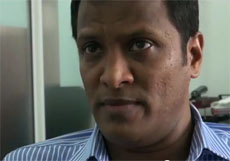President Mohamed Nasheed pleaded with mutineering security forces to protect his family, in exchange for his resignation, as police, soldiers and opposition protesters assaulted defence headquarters on the morning of February 7.
The previously unheard recording, obtained by SBS journalist Mark Davis, was aired on Australian television on Tuesday night.
“While the international community deliberates on whether Nasheed resigned under duress or not, this audio recording, broadcast for the first time, may be illuminating,” says the multi Walkley-award winning journalist.
In the clip, “minutes after representatives of the opposition made their threats of bloodshed”, Nasheed agrees that he will resign as long as the soldiers protect his family.
“”No problem”, one replies. “I will protect your family with Allah’s will.”
“You should do that for me under the circumstances. I should settle this with you first, right here, OK?” Nasheed is heard to say.
“Then I’ll go to the President’s Office and publicly announce that in my view the best thing for this country right now is my resignation. Is that all right? That’s what I’ll say.”
“That was an attempt for me to get out of where I was,” Nasheed tells Davis afterwards.
“Yes, I could have held on, but that would have been at very huge cost to the country and the people. There would have been a lot of blood.”
Davis’s documentary, produced for the SBS Dateline program, also features a frank interview with Umar Naseer, Vice President of former President Maumoon Abdul Gayoom’s Progressive Party of the Maldives (PPM).

In the interview, Naseer explains in English what happened from the perspective of the opposition demonstrators on February 7.
“We had a small command centre where we do all the protests. I command from the centre and give instructions to my people,” Naseer explained.
“On the protesters’ side, we were informing and educating the police and army through our speeches and television programs.”
Asked by Davis if the opposition had made any other inducements, such as promises that they and their families would be “looked after” if they switched sides, Naseer said “there were.”
“We called on army and police and said that if a person was fired from his position because of their refusal to follow an unlawful order, the opposition would take care of them,” Naseer said.
After former army officer Mohamed Nazim and dismissed police chief Abdulla Riyaz were ushered into the military base, to cries of “Nazim sir!”, Umar Naseer explained to Davis that Nazim called him seeking permission to negotiate Nasheed’s surrender on behalf of the opposition.
“It was around 7-7:30am, and Nazim – the present defence minister – called me and said ‘I’m inside the Defence Headquarters, can I talk on behalf of the opposition?’ I said ‘You can talk, but don’t agree to anything without our authority.’”
“I had told Nasheed to resign, and that I was afraid for his life – because if Nasheed came out of the headquarters, people might beat him on the streets,” Naseer said.
Nasheed should now “face justice” rather than an election, Umar Naseer told Davis, “And I think he will get a prison term of 10-15 years.”
“You don’t give up easily. You’ve got the guy out of government now you want to see him in prison?” Davis responded.
“We want to see justice served,” Naseer replied. “He is seeking an election because he wants to get away with this sentence. I have no doubt that Mr Nasheed will be out of Maldivian politics for a long time. We want to make sure of that.”
In the documentary, Nasheed presses for an early election date as “the only way to stabilise the country”.
However it was “not so simple, according to newly appointed President Dr Mohamed Waheed Hassan,” says Davis.
“People are not convinced at the moment that we could hold free and fair elections today. Partly because there are so many deep divisions. The conditions are not right for an election just now,” Dr Waheed tells Davis.
At one point Dr Waheed’s answer to a question from Davis is interrupted by an individual later identified as Dr Ananda Kumarasiri, a 30 year veteran of the Malaysian foreign service and Buddhist author, who told journalists he was “just a friend passing through”.
“If I may inject, from the video tapes, I do not see how my colleague has got this impression that there was a coup. If there was a coup then [it would show] from the tapes… from the evidence,” Dr Kumarasiri says.
Davis observed that Dr Waheed’s “attempt to project an independent image was not helped by the advisors that now surround him.”
Nasheed appears upbeat in the Dateline documentary, describing the takeover as perhaps “a blessing in disguise.”
“The criminals are now obvious. The pictures are there. The people are identified. We are now able to reform a very, very brutal police, because we now understand who is who. and what everyone has been doing,” the former President says.
“We don’t give up. We’ve won against odds before. I’ve fallen many times before but I’ve been able to get back up, and start it all over again. I don’t see any difference now.”